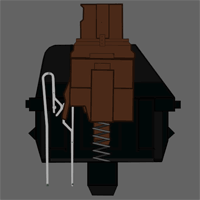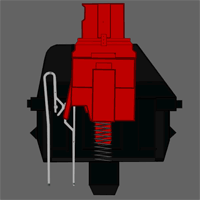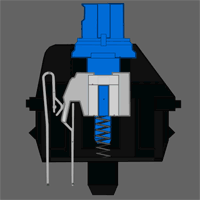 |
| Code Mechanical Keyboard - https://codekeyboards.com/galleria/3.jpg |
We use our computers every day, which does involve a lot of writing. Most of the people do not really care what keyboard they have, as long as it works properly. While I can understand the reasoning behind that, I think it's worth a few minutes to talk about mechanical keyboards.
I'm a programmer, so by definition I write a lot. The keyboard is my primary tool - it was very important for me to choose the one I'm satisfied with. I'm quite sure that I'm not the only person that writes a lot, in fact, you might want to change your keyboard even if you're a casual writer, simply because your hands will thank you for that. It feels a lot better if writing on a keyboard is not connected with nearly any effort, and mechanical keyboards can greatly help with that.
Mechanical keyboards
So the primary question is, what is mechanical keyboard and how it's different from "normal" membrane one, why you should even bother getting one if you already have your old working keyboard? Here is a short 3-minutes comparison video that will answer that:Switches type
The most interesting thing in mechanical keyboards is the fact that you have a lot of freedom when it comes to type of switches you're satisfied with. Yes, unlike membrane keyboards, you can actually pick the type that will fit your general usage, which can dramatically increase your comfort. There are many types available, I've decided to shortly describe 3 most popular ones, with all following descriptions taken from Keyboardco:
"The most popular type of tactile, non-clicky switch is the Cherry MX Brown. This switch was introduced in 1994 as a special ‘ergo soft’ switch, but quickly became one of the most popular switches. Today, the majority of Filco keyboards are sold with Brown switches, as the switch is a good middle-of-the-road option appropriate for both typing and gaming. They are also ideal for typing in office environments, where a clicky switch might annoy some."
"Conversely, Cherry MX Red switches were only introduced in 2008 and are the most recent switch to be developed by the company. They have a low actuation force, at 45 cN – tied with Brown for the lowest of the four most common switches. Red switches have been marketed as a gaming switch, with the light weighting allowing for more rapid actuation, and have become increasingly common in gaming keyboards."
"The Cherry MX Blue is the most common clicky switch, and was first made available in Filco keyboards in 2007. Blue switches are favoured by typists due to their tactile bump and audible click, but can be less suitable for gaming as the weighting is relatively high – 50 cN – and it is a bit harder to double tap, as the release point is above the actuation point. Blue switches are noticeably louder than other mechanical switches, which are already louder than rubber domes, so these switches can be a bit disruptive in close working conditions."
Personal opinion
I've used 3 mechanical keyboards so far, with red, blue, and brown switches. I'd recommend reds for people that are mainly playing fast-paced FPS games, since at least for me they're too soft for normal writing and it's very easy to make mistakes. Blues on the other hand are perfect for writing, but their clicky sound can very easily annoy people around you, so I'd recommend it for heavy-typists working in their room, although it's a matter of preference. My current favourite type is brown, it's basically a mix of reds and blues - it's non-linear tactile switch, but without an audible click like blue, while at the same time being a bit more heavy than red. It's a perfect choice for the majority of people, especially those that both write and play games (like me), but also all people working in offices and other places that involve a lot of typing. For people that are interested in the subject, I'm leaving some extra materials in the sources, including a link to a YouTube video that nicely shows how different type of switches sound like. Also, if you're wondering which keyboard model I'm personally using right now, it's CMStorm QuickFire Rapid-I with brown switches. The biggest advantage of tactile-feedback switches like browns or blues is the fact that you know the exact moment when a given button was pushed, so you can quickly learn how to type by pushing buttons only to their "half", which can drastically improve the comfort of typing.
Questions
1. Do you write a lot? Have you ever got tired due to writing for a longer while?
2. Have you ever used the mechanical keyboard? If yes, which one?
3. What is your opinion about mechanical keyboards? If you never used one, would you like to give it a try?
4. Do you think that it's rather important thing to choose a proper keyboard for yourself, or maybe it doesn't matter that much?
Thank you for reading.
Thank you for reading.
Sources
- https://www.youtube.com/watch?v=qp46JeDDTCw - promised sound comparison
- https://www.youtube.com/watch?v=CVtjCbpW7as
- http://www.keyboardco.com/blog/index.php/2012/12/an-introduction-to-cherry-mx-mechanical-switches/
- https://en.wikipedia.org/wiki/Keyboard_technology
- https://codekeyboards.com/galleria/3.jpg



Comments
I have never tried using mechanical keyboard. I don't think I need it at all.
Maybe mechanical keyboard is a good solution for people who really write a lot. I don't think that I will ever try using one.
In my opinion choosing keyboard is important but not to much. People get used to everything. Even if new one may be some kind of uncomfortable, it's possible to get used to it.
First of all - comfort. We like it and it is easier and pore pleasant to work if you feel comfortable.
I believe that right one will be less tiresome and maybe healthier? Because there are instructions how your hands should work while typing, so maybe right one will make it easier or will help to stay with proper technique
Any developer's work is basically typing the code and terminal commands. I guess I'll give it a try with the brown switches, because I don't want keys to be too soft and clicking may annoy people around, I have a membrane keyboard and it's already too noisy.
I don't have a problem with my current one in laptop, and I'm not a gamer so I'm not going to try a mechanical one.
I think it is good to have a nice set of work tools, but from my experience keyboards are easy to get used to nad things like a comfortable chair are more important.
Yes as soon as I got my first computer it was a mechanical keyboard , but its advantages then I couldn't appreciate in full measure.
I think I definitely will test this kind of keyboard may not be the same company and model which is presented in this article.
Yes of course I think if you pretty much type we have to choose clavicula most comfortable for you , I think clavicula in terms of comfort, maybe just a little bit inferior to for example the table for which you work or the chair.
I could try the other type of keyboard, why not? However my favourite one, which is perfect for me is an Apple keyboard which is smooth and doesn't give me the feeling of being tired of writing. In my opinion it is crucial to find the perfect keyboard type, because when it is not comfortable to us, we are not able to focus on the activity we do, instead, we focus on the fact that the keyboard is annoying and interrupts our work.
https://en.wikipedia.org/wiki/Keyboard_technology#Scissor-switch_keyboard
Mechanical keyboard reqiures more time for typing, so my choice was a scissor-switch keyboard. And they look more modern)
"Butterfly mechanism
Traditional keyboards use a scissor mechanism, which tends to wobble around the edges. This creates a lack of precision when you strike anywhere except the center of the key. We needed to reduce key wobbling for a keyboard this thin; otherwise, striking a key off-center could result in the keycap hitting bottom before a keystroke registers. So we designed a unique butterfly mechanism, which is wider than the scissor mechanism and has a single assembly made from a stiffer material — allowing for a more stable, responsive key that takes up less vertical space. This innovative design improves stability, uniformity, and control — no matter where you press on the key."
Thanks to your presentation now I know that not all mechanical keyboards have this clicking sound that drives me crazy.
Now I’ll definitely consider buying mechanical keyboard, because the clicking sound was the only think that I was stuck with my membrane keyboard.
I've never tried mechanical keyboard although I've heard many positive opinions about it. Didn't know there are at least three types of it. I'd like to give it a try but for now I like my laptop's keys much. Thinkpad keyboards FTW! ;)
I never used mechanical keyboards but now I know that I have to try. Thanks.
Of course that comfortable keyboard is important, but mechanical keyboards are overpriced and idealized.